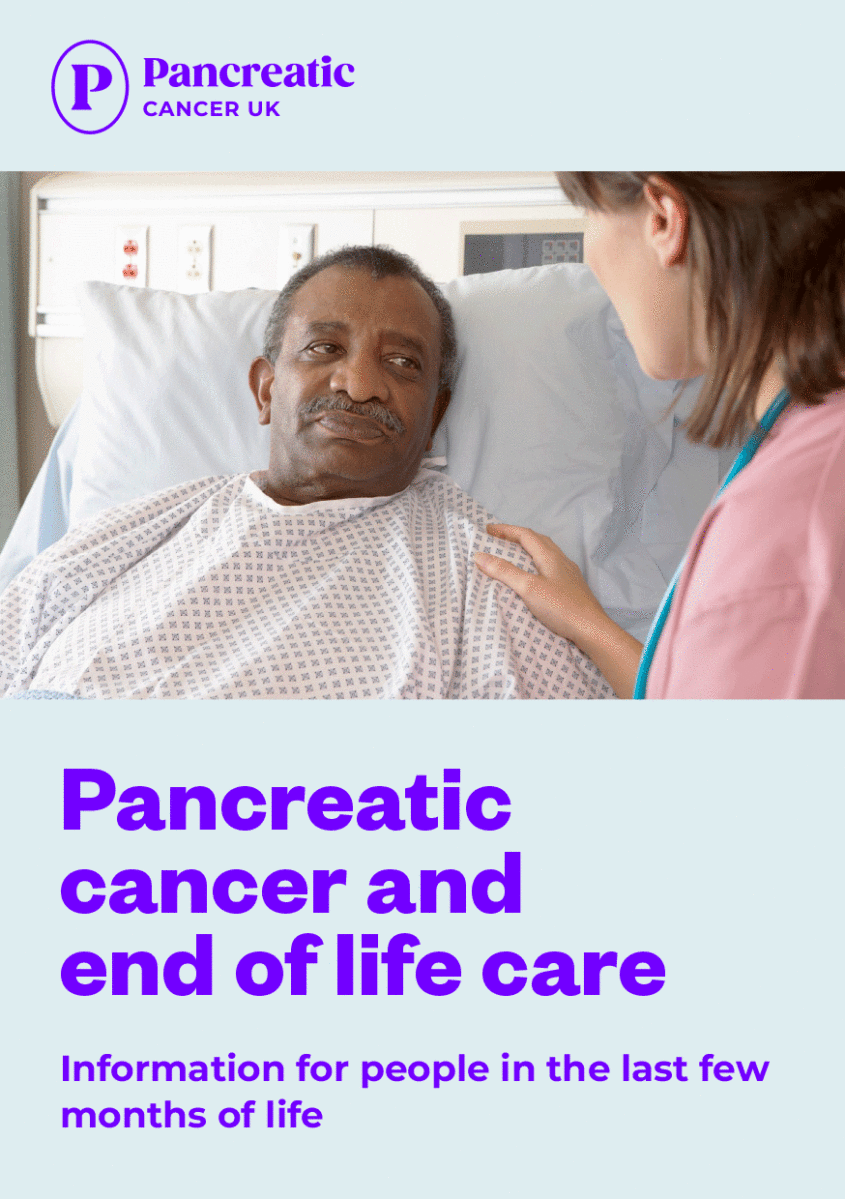Read about other symptoms at the end of life
- Pain towards the end of life
- Fatigue at the end of life
- Diet and digestion at the end of life
- Weight loss and reduced appetite towards the end of life
- Feeling and being sick at the end of life
- Stomach emptying slowly towards end of life
- Bowel problems towards the end of life
- Swelling (ascites and oedema)
- Jaundice in the last few months
- Bedsores towards the end of life
- Anxiety and depression towards the end of life
Pancreatic cancer can cause problems with digesting food. This can cause symptoms such as discomfort after eating, bloating, appetite loss, weight loss, and changes to your poo. Some people get a dry mouth towards the end of life, which can be uncomfortable and make eating more difficult.
If you have diabetes and are approaching the end of life, you will need to speak to your healthcare team about how to manage your diabetes.
How are problems with digestion managed?
Pancreatic enzyme replacement therapy (PERT) helps to break down your food, and can help manage these symptoms. There are different brands of pancreatic enzymes, which include Creon®, Nutrizym® and Pancrex®. You should take pancreatic enzymes with food for as long as you are still eating.
If you are still eating but have not been given PERT, speak to your medical team. If you are no longer able to eat you do not need to take pancreatic enzymes.
Taking PERT if you are in hospital or a hospice
If you go into a hospice or hospital and are taking pancreatic enzymes, tell the staff about this.
Healthcare professionals who are not specialised in pancreatic cancer may not know about it. Explain that you need to take it with food, milky drinks or nutritional supplements, to help digest these. It may help to keep the capsules by your bed.
Hospices or hospitals sometimes look at all your medicines and stop any that are no longer needed. Tell them why you still need to take PERT. It’s very important that you still take it if you are eating or taking nutritional supplements, to help you digest your food.
Dry mouth
Some people get a dry mouth, which can be uncomfortable. It can also make it harder to chew or swallow food. You may need more time to talk, or to take sips of fluid more often when you are talking.
What can help?
- Try to keep your mouth clean by brushing your teeth regularly and using mouthwash.
- Try chewing gum, taking regular sips of drinks and sucking ice cubes or ice lollies. Eating refrigerated pineapple cubes can help too.
- Use a small spray bottle to mist your mouth with water.
- You can also get products from the pharmacy.
- Use a lip balm to stop your lips getting dry.
Read more tips on coping with a dry mouth
Tips for coping with a dry mouthDiabetes
If you have diabetes, the way your diabetes is managed may change as you approach the end of life. For example, you may not need to monitor your blood sugar levels as much, and higher blood sugar levels may not be a problem if you are feeling well.
Speak to your doctor, diabetes nurse or pancreatic dietitian for advice about how to manage it. They may talk to you about changing the dose or type of diabetes medicine you take if, for example, you are eating less or have problems swallowing. They can also give you advice about how to manage diabetes alongside your other medicines, such as PERT.
Read more about managing diabetes if you have pancreatic cancer.
Managing diabetes if you have pancreatic cancerSpeak to our nurses
You can speak to our specialist nurses on our Support Line with any questions about digestion, taking PERT or managing diabetes at the end of life.


Read our booklet about end of life care
To read more about symptoms and care at the end of life, download our booklet, Pancreatic cancer and end of life care. Information for people in the last few months of life.
You can also order a physical copy.


Published August 2024
Review date August 2027

